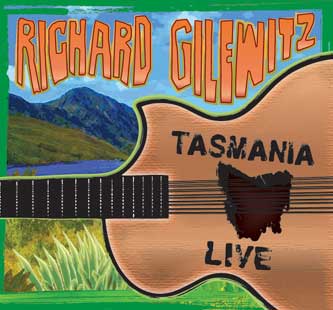 Florida-based
guitarist Richard Gilewitz has long been on the musical radar
of guitar fans for years. Richard’s 2004 album, Thumbsing
drew praises from the guitar community and he has returned in
recent years with several new albums including a 2011 album called
Tasmania Live. Inspired by the 1981 album, John
Fahey Live In Tasmania, Richard’s Tasmania Live is
very much rooted in the Fahey style of finger-style acoustic instrumental
guitar music, jazzed-up with a liberal dose of Ragtime-flavored acoustic
guitar magic. Recorded live at the old theatre at the University Of
Tasmania in Australia, the 22 track CD features covers some of the
most famous guitar music of all time with many of the tracks penned
by guitarists with huge names like Kaukonen, Fahey and Kottke. Along
with a sprinkling of originals, Tasmania Live is a good example
of the Gilewitz
live
concert experience. More recent from Richard is his latest single
called “Fuschia Circle North” released in 2017 through CD
baby. There’s a definite Irish music lilt to the track, which
features Richard’s guitar performing a duet with fellow guitarist
Stephen Housden along with some excellent flute work by Margaret
Kennedy. In addition to his inspiring acoustic guitar work, Richard
Gilewitz is also a renowned music instructor and his latest book on
Mel Bay is called First Lessons: Fingerstyle Ukulele.
An easy how-to book for aspiring Uke fans, the 40 page book includes
plenty of easy to read sheet music featuring Uke transcriptions of
song classics from “Bicycle Built For Two” to “Waltzing
Matilda”. Guitar fans could also learn learn something from the
easy to read, melody lines that accompany the chord transcriptions
as well as the song histories of each track. With so many albums and
music books to his credit, Richard Gilewitz is a true renaissance
man of the fretboard world. www.richardgilewitz.com
Florida-based
guitarist Richard Gilewitz has long been on the musical radar
of guitar fans for years. Richard’s 2004 album, Thumbsing
drew praises from the guitar community and he has returned in
recent years with several new albums including a 2011 album called
Tasmania Live. Inspired by the 1981 album, John
Fahey Live In Tasmania, Richard’s Tasmania Live is
very much rooted in the Fahey style of finger-style acoustic instrumental
guitar music, jazzed-up with a liberal dose of Ragtime-flavored acoustic
guitar magic. Recorded live at the old theatre at the University Of
Tasmania in Australia, the 22 track CD features covers some of the
most famous guitar music of all time with many of the tracks penned
by guitarists with huge names like Kaukonen, Fahey and Kottke. Along
with a sprinkling of originals, Tasmania Live is a good example
of the Gilewitz
live
concert experience. More recent from Richard is his latest single
called “Fuschia Circle North” released in 2017 through CD
baby. There’s a definite Irish music lilt to the track, which
features Richard’s guitar performing a duet with fellow guitarist
Stephen Housden along with some excellent flute work by Margaret
Kennedy. In addition to his inspiring acoustic guitar work, Richard
Gilewitz is also a renowned music instructor and his latest book on
Mel Bay is called First Lessons: Fingerstyle Ukulele.
An easy how-to book for aspiring Uke fans, the 40 page book includes
plenty of easy to read sheet music featuring Uke transcriptions of
song classics from “Bicycle Built For Two” to “Waltzing
Matilda”. Guitar fans could also learn learn something from the
easy to read, melody lines that accompany the chord transcriptions
as well as the song histories of each track. With so many albums and
music books to his credit, Richard Gilewitz is a true renaissance
man of the fretboard world. www.richardgilewitz.com
mwe3.com presents an interview with
Richard Gilewitz
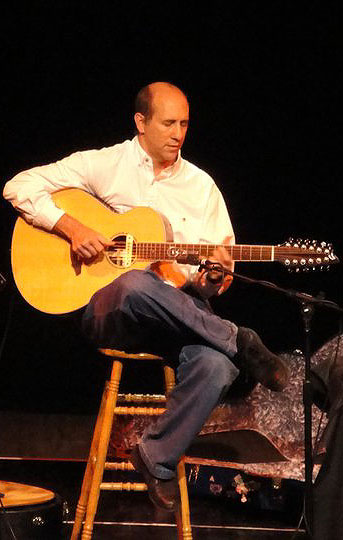 mwe3:
We haven’t spoke in several years. I remember featuring you in
20th century guitar magazine. So tell us about your current tour in
Australia. You’ve played there before because you have some friends
down under right, so when are you returning to Florida?
mwe3:
We haven’t spoke in several years. I remember featuring you in
20th century guitar magazine. So tell us about your current tour in
Australia. You’ve played there before because you have some friends
down under right, so when are you returning to Florida?
Richard Gilewitz: I believe this is my 6th or 7th tour to Australia
and I've actually been to New Zealand about 15 times. Funny enough
it all started with a pig… didn't that happen also with the Hatfields
and McCoys as well? My wife sent one of my CDs to an agent with Flying
Piglet Productions in New Zealand who primarily worked with singer
songwriters. Since her husband Pete, a well to do pig farmer, was
a big fan of my style she took me on for a try and the tour went well.
Soon afterwards Australia being in the reasonable proximity of a 4
hour flight, wound up in the touring scheme. I have made so many friends
in both countries and we always stay in touch. I will be returning
to Florida after 3 months on the road in Hungary, Austria, Germany,
New Zealand and Australia the end of June 2018. Touring that long
is simply put, weird. It's almost like we live on a planet.
mwe3: Seems like you’ve been focusing more upon issuing
single tracks rather than full length CDs these days. You have recently
released a new single called “Fuschia Circle North”. Funny
how it was inspired by your first home in Florida yet recorded in
Ireland with fellow guitarist Stephen Housden from the Little River
Band. How did you meet Stephen and what else can you tell us about
“Fuschia Circle North”?
Richard Gilewitz: CD's will sell periodically at shows and
I believe the reason they do is because people either want to have
a memory of the night, support the artist, or gift someone. However
everyone knows that sales are down in that arena and many artists
do seem to be going digitally on line. I still try to respect the
recording process and try to offer the best quality possible but singles
can achieve nearly instant international recognition and so the need
to put out an entire CD release doesn't grab me as much as focusing
on a particular tune.
Funny thing about this tune is that the initial lick or motif began
in Australia. I had just finished a tour, had three days off, and
as I noodled around I came up with a little pattern that stuck and
developed over time. When I was at the Clonakilty International Guitar
Festival in Ireland I played it for Stephen at his house and he couldn't
seem to get it out of his head. I had met Stephen at this same festival
many many years before and we've become great friends. That evening
he asked me to stick around, have dinner and record the tune in his
studio, which we did in a straight shot between 9pm and 3am. I borrowed
one of his guitars, played it straight through with a couple of sequence
changes by Stephen, put on the headphones, and using my original take
as a sort of click track, grabbed a different guitar in his studio
and played the entire piece note for note. I still don't know how
I did that! Stephen created somewhat of a natural chorus effect with
the two guitars with somewhat of a panning process but there were
actually no effects used.
He then invited his flute player, Margaret Kennedy over to listen
to the recording and create a melody. A bit later after I had flown
home Stephen added some little bits and riffs here and there and the
tune was born. It was one of the most fun times I've ever had in the
studio. Normally it's an incomprehensibly nerve wracking experience
for me but this felt like a true team effort and although exhausted
I was very proud, honored to work with two world class players, and
I had a blast.
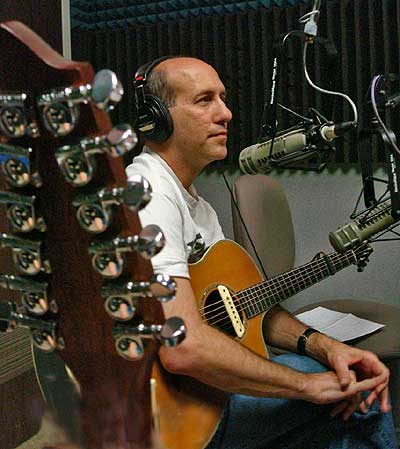 mwe3:
I’m glad to have heard your Live In Tasmania album, which
goes back to 2011. Was the 1981 album by John Fahey also called Live
In Tasmania a big inspiration to go there to record? What is Tasmania
like? I thought it was in Africa. I heard it was the coldest day of
the year there when you recorded? Funny how it’s winter there
when it’s summer here. Steve Gadd wrote the liner notes to the
CD. I thought it was drummer Steve Gadd but it’s a different
Steve Gadd right?
mwe3:
I’m glad to have heard your Live In Tasmania album, which
goes back to 2011. Was the 1981 album by John Fahey also called Live
In Tasmania a big inspiration to go there to record? What is Tasmania
like? I thought it was in Africa. I heard it was the coldest day of
the year there when you recorded? Funny how it’s winter there
when it’s summer here. Steve Gadd wrote the liner notes to the
CD. I thought it was drummer Steve Gadd but it’s a different
Steve Gadd right?
Richard Gilewitz: After a couple of more trips to the region,
someone in Tasmania Australia caught wind that I was fairly close
and invited me to do a repeat effort of what my guitar hero John Fahey
had done 30 years before... do a live recording in Tasmania. Turned
out my friend Steve Gadd, not the drummer, was at John’s show
and knew of my connection with him since Fahey and I did a couple
of short tours together and my ex-wife was his booking agent, briefly.
John Fahey's recording was actually called Live in Tasmania!
and so when I did my recording I didn't have a lot to work with in
the way of titles so I simply said, Tasmania Live! I believe
you're thinking of Tanzania... maybe I'll play there one day! To go
further back, I'm friends with Melody Fahey who was with John at the
time and she told me that the original inspiration for their trip
over was because they had an argument as to whether or not the Tasmanian
Devil was real. I think he wanted to prove it to her, or was just
looking for an excuse to go… and I believe he won that bet. Very
interesting thing about the Tasmania Devil is that I understand they
not only have the bite strength of a crocodile but also have a transmissible
mouth cancer which is threatening the species.
mwe3: Does Tasmania Live album really represent what
you do live best? Some great covers on there too including Leo Kottke
covers. How would you describe Leo’s influence on your music,
and besides recording a live album in Tasmania what about Fahey’s
influence? I heard you opened concerts for Fahey and Kottke too.
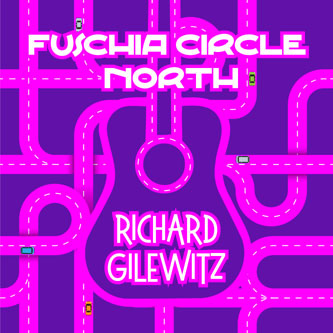 Richard
Gilewitz: Yes, I would have to say that the Tasmania Live
recording is very representative of what I do during a show.
A few original tunes, a few by my mentors, a couple of arrangements
by my teacher David Walbert, a couple of my arrangements, and a few
pointless stories and bad jokes. Gotta add in the human element.
Richard
Gilewitz: Yes, I would have to say that the Tasmania Live
recording is very representative of what I do during a show.
A few original tunes, a few by my mentors, a couple of arrangements
by my teacher David Walbert, a couple of my arrangements, and a few
pointless stories and bad jokes. Gotta add in the human element.
Both John Fahey and Leo Kottke were huge influences on me obviously
but I also came from a background in classical guitar, music studies
in college with an abundance of lessons over the years with my guitar
teacher David Walbert, who by the way is one of the three inventors
of the board game Trivial Pursuit, the Beatles, J.S. Bach, Andres
Segovia and a plethora of other classical guitarists, Kraftwerk, Depeche
Mode and loads of percussion...the list goes on. Plus a lot
of touring and the experience of meeting so many musicians worldwide.
I have done a show with Leo before and a few with John. Glad to call
them both friends although John has been gone for awhile.
mwe3: You also opened concerts for California Guitar Trio and
I saw several pics of you with Bert Lams. Bert is kind of a neighbor
of yours. Funny how both of you live so close to each other in Florida.
Your music and the music of CGT are quite similar in that you each
have your own style yet you also sound inspired by similar guitar
styles.
Richard Gilewitz: I originally met the CGT in Oregon since
we had the same sponsor, Breedlove guitars. We met up at the Breedlove
Guitar Experience in Bend and were part of a special weekend where
individuals were allowed to meet the builders, tour the factory, and
select the woods of their choice to have an instrument taylored to
their liking and built before their very eyes, at least initially.
The CGT happened to be in the audience when I recorded my CD Live
at 2nd Street Theatre. I have since done a couple of shows with
them, one recently down in South Florida at the Kravis Centre. I believe
my style was for the most part developed before meeting them. I understand
they come from the world of Robert Fripp, which is how they met each
other. I have become closest to Bert and we may hopefully wind up
doing a few shows together at some point. We'll see how the wind blows.
mwe3: How about Ragtime guitar? With your fingertyle and thumb
bass picking, Ragtime sounds right up your street, musically speaking.
Would you say Ragtime guitar is very central to your guitar style
and technique?
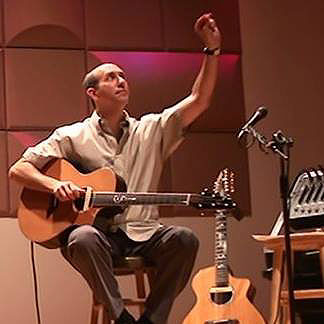 Richard
Gilewitz: I'm glad you mentioned Ragtime. When I was naming influences
I forgot to mention Stefan Grossman and his instructional tablature
books. That is really a big part of my foundation and to this day
I still think that stuff is hard to play! The Kicking Mule label from
the 1970's played a huge role in my formative years. Another book
I recall working out of at that time was Aaron Shearer's Classical
Guitar Technique Vol. 1 which as a book is still live and well
today. I think my style is a real morph of classical guitar, ragtime,
blues, folk, pop, Kottke, Fahey, another fellow named Peter Lang,
and a few thousand hours of simply instinctive playing as I plunked
around.
Richard
Gilewitz: I'm glad you mentioned Ragtime. When I was naming influences
I forgot to mention Stefan Grossman and his instructional tablature
books. That is really a big part of my foundation and to this day
I still think that stuff is hard to play! The Kicking Mule label from
the 1970's played a huge role in my formative years. Another book
I recall working out of at that time was Aaron Shearer's Classical
Guitar Technique Vol. 1 which as a book is still live and well
today. I think my style is a real morph of classical guitar, ragtime,
blues, folk, pop, Kottke, Fahey, another fellow named Peter Lang,
and a few thousand hours of simply instinctive playing as I plunked
around.
mwe3: Your cover of “When I’m 64” sounds very
inspiring. Never enough Beatles covers on acoustic guitar right? What
makes Beatles music so perfect to cover for guitar instrumentals and
are there other Beatles tracks you play on guitar?
Richard Gilewitz: There are a zillion guitarists playing Beatles
covers on acoustic guitar but I prefer the arrangements of my teacher
David Walbert. Just stunning what he can do. His voicings, chord choices
accompanying such beautiful melodies and accuracy is just astounding.
He will also incorporate in some of his own little creations in the
midst of the tune and it's just magical. I've been working on his
arrangement of “Eleanor Rigby” for over five years now.
I have played it in concert many times but that is just part of the
development of the tune. Performance helps to bring a tune to life
in a way you can't get any other way.
I also play these covers of the Beatles… just off the top of
my head. "I Will", "If I Fell", "Here Comes
the Sun", "Eleanor Rigby". I'm sure there are a couple
of others but they are not clicking into my head right now. I recently
realized that I have over a five hour repertoire of tunes memorized
at performance level and they often blend together. I have to take
time to differentiate what goes where. Something that helps is to
compartmentalize the Open D tunes, the Open G tunes, Open C, Drop
D, tunes using a capo, tunes on the 12 string, slide tunes, original
tunes. These little groupings help when I'm trying to pull something
out of the hat. But the Beatles? Absolutely! Some of my favorites.
mwe3: You’re also a guitar teacher and author of instruction
books on guitar and ukulele. How did you start with Mel Bay on the
production of the book. How many instruction books have you written
and how does a book compare with doing instruction videos, say on
you tube for example? I read your story in the Ukulele book and you
didn’t really plan to do the Uke book but your friend in the
U.K. talked you into it right?
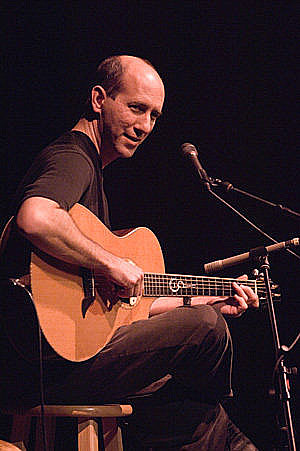 Richard
Gilewitz: Yes, the Uke book was a rather interesting endeavor.
I almost took it on as a dare, or a hobby, but became intrigued rather
quickly. I began to realize that about 90% of what I did on the guitar
worked out just fine on the uke. The hardest thing for me was learning
how to hold it. I couldn't seem to find a comfortable stabilization
point for awhile. I thought about slapping some velcro on the back
and then just slamming it against my chest!
Richard
Gilewitz: Yes, the Uke book was a rather interesting endeavor.
I almost took it on as a dare, or a hobby, but became intrigued rather
quickly. I began to realize that about 90% of what I did on the guitar
worked out just fine on the uke. The hardest thing for me was learning
how to hold it. I couldn't seem to find a comfortable stabilization
point for awhile. I thought about slapping some velcro on the back
and then just slamming it against my chest!
The first book I did with Mel Bay was the Fingerstyle Acoustic Guitar
Workshop Book, which was based on the fact that I kept getting the
same questions at clinic after clinic in music stores around the country.
When I approached Mel Bay about an idea to put out a book with all
of the most popular questions and my answers they went for it.
I have done several projects with another company called TrueFire
which includes "Guitar Foundations", the basics of guitar
for finger-style, "Fingerscapes", an exploration of open
tunings, "Acoustic Slide Guide" for the slide guitar player,
and "Fingerstyle Narratives", which details some of my more
complex originals. The Mel Bay Ukulele book for beginners and finger-style
players has also been released in German by a company out of Vienna
called Doblinger.
The biggest difference in the youtube lessons and these projects is
that the book and DVD projects entail a lot more production, camera
angles, PDF's, and a very structured approach. The YouTube ones I'm
thinking are a bit more one offs on a particular topic, exercise or
approach.
mwe3: What do you make of the way things have evolved for artists
considering that you tube makes it so easy and affordable to hear
music these days? Has the internet and streaming services and you
tube made it easier or more difficult for artists to survive? I also
see your Ukulele book is also on Kindle. What do you make of Kindle?
Richard Gilewitz: I have very mixed feelings about what youtube
has done for ... and to the player. On one hand players have
access to so many musicians worldwide that they would otherwise not
have a chance to see and hear. And if you're lucky, you can find an
original performance that allows you to observe fingerings and feels
from the originator of a piece. On the other hand, there is not a
filter to keep out massively inaccurate renditions by players. These
inaccuracies are spreading like wildfire and there seems to be quite
a dissipation of what was originally intended. I also recall a guitar
teacher in Missouri telling me that 25 years ago students wanted to
really read and understand standard musical notation and understand
music. Now he says that a lot of his students come to him and say
"if you don't help me figure out this YouTube song I'll just
go find another teacher." Wow! That one was disturbing. I even
sometimes run across students who had no idea you could tune a guitar
without a guitar tuner! Double wow! So, I don't know… I could
go on a lot longer about this subject but I'll leave it to that for
now - pros and cons. I am grateful that it has been an avenue for
me to get my music out there so I suppose I shouldn't complain.
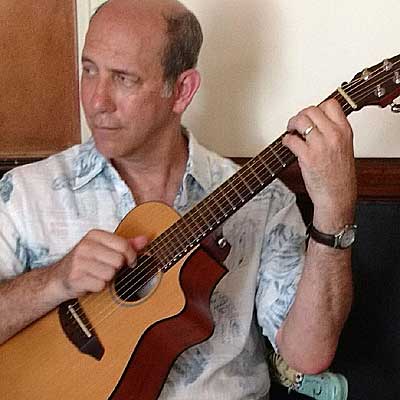 mwe3:
By your account, how many albums and singles have you released so
far and are all your CDs still in print? Would you consider a CD sampler
to present a cross-section of your music and if you could present
a best of, what tracks would you say represents the best of Richard
Gilewitz?
mwe3:
By your account, how many albums and singles have you released so
far and are all your CDs still in print? Would you consider a CD sampler
to present a cross-section of your music and if you could present
a best of, what tracks would you say represents the best of Richard
Gilewitz?
Richard Gilewitz: I believe I have one LP - Somewhere In
Between out but not currently available, 7 CD titles, a guitar
and ukulele book with Mel Bay, a concert DVD with Mel Bay, and 4 or
5 previously mentioned works with TrueFire.
Everything seems to be available on itunes, Spotify, etc. In other
words I'm not sure about actually doing a CD sampler but I suppose
if I did I should gather up all of my originals and pay close attention
to the sequencing of the tunes which is a whole 'nother art form.
Seems like my open G minor 12 string tune "Dirt To Dust"
is a big hit because it's so unusual but still very accessible to
the general public. I also wrote one for the Blue Penguins of New
Zealand called "Have You Ever Seen a Rainbow At Night?",
that gets a lot of attention. Another is probably the tune I wrote
and originally called "Echoing Wilderness", which gained
the retitle "Echoing Gilewitz" when Leo Kottke recorded
it back in 1986 on his Private Music release A Shout Toward Noon.
mwe3: When are you planning to return to Florida and what
other events are upcoming? You were telling me about a live show planned
in September with Tony McManus and Mark Russell. What will that show
be like?
Richard Gilewitz: Although I'll be back the end of June I have
several more tours already planned that include Alaska, Wyoming, Oregon,
Indiana, Michigan, possibly Texas and back again to Australia. That's
just this year. Sometimes I feel like a 'ground astronaut'. I don't
know what that means but it sounds kinda cool.
The show I'll be doing in Jupiter in September with Tony McManus and
Mark Russell should be a real special one. Tony who is from Scotland
and currently living in Canada is probably one of the greatest Celtic
 style
players on the planet and a terrific entertainer. Mark Russell, from
Australia, a world class fiddle/violin player, was head of a band
that toured 50 stadium concert dates with Dire Straits during their
"Brothers In Arms" tour in Australia. I have done a few
shows with Mark over the years and he's hilarious as well as a jaw
dropping player. If I play my cards right I'll just sneak off the
stage and watch these two players during the night. It really should
be fun. I don't think any of us know what's going to happen either.
style
players on the planet and a terrific entertainer. Mark Russell, from
Australia, a world class fiddle/violin player, was head of a band
that toured 50 stadium concert dates with Dire Straits during their
"Brothers In Arms" tour in Australia. I have done a few
shows with Mark over the years and he's hilarious as well as a jaw
dropping player. If I play my cards right I'll just sneak off the
stage and watch these two players during the night. It really should
be fun. I don't think any of us know what's going to happen either.



